- Home
- Deborah Smith
Alice At Heart Page 11
Alice At Heart Read online
Page 11
Sweating with exertion, he stripped and sank himself in the tepid water of a claw-footed tub, propping his sodden cast on the rim. The wind sang melancholy warnings he ignored. Methodically, he soaped and washed the stink of defeat from his skin. He lingered in the soapy water even when every overused muscle cried out for bed. Armed with scissors and a package of disposable razors, he shaved off his ragged beard and cut his hair.
It was after midnight when he finished drying and dressing himself in faded gray sweats bearing the logo of a catamaran race he’d won years earlier, when his simpler obsessions included dominating the sea with speed as well as depth. He limped to a small temporary kitchen C.A. had installed in a corner of his upstairs bedroom, where he drank a pint of thick cream and ate several cans of tuna.
Finally, he went to bed, straightening the careless covers, aligning himself with staunch, painful discipline instead of drugged chaos, lying in the dark with his gaze trained on the vista of black ocean, cold white stars, and thoughts of Alice Riley. She was out there, on Sainte’s Point, her solemn, stunning face turned up to this same sky. If he could unravel Alice’s mysteries, he might unlock the secrets he was now convinced that Lilith Bonavendier and her sisters had kept from him. He might understand their relationship with his mother and what they knew about her and his father’s deaths, about his own survival, then and now. There was something, something he had to find out—he couldn’t name it but could now identify the longing at least. Alice might piece it out, help him, be persuaded to tell what she learned from her new kin. Alice could be used.
I only want what I deserve, he told himself.
The hard course of desire rose in him at that thought, and he realized he wanted answers but he also wanted Alice Riley, or even Alice Bonavendier, whoever and whatever she was, whether he deserved her or not. He laid a cool, strong hand on himself.
He intended to recover, to grow stronger, to go to Sainte’s Point with a plan in mind—to put facts with the faces that floated before him in his memories. Because if Alice Riley could do what he’d seen her do today, and the communication he shared with her was not a mutual delusion, then anything was possible. The hard truth about the Bonavendiers and his parents could be uncovered.
He lived tonight because of Alice Riley.
Ali, he decided to call her, changing her just as she’d changed him, owning her gently, by a new given name.
13
The Celts called him The Waterman and said he was once a sea-god named Dewi. In Christian times, he became Saint David. By any name, he was reported to be irresistible when playing the harp and singing. No doubt, since he was one of us.
—Lilith
If the sisters suspected I had met their Randolph neighbor, they said nothing and neither did I. I tried to put him out of my mind and intended to keep him out, if possible. Everything was too confusing.
I have come to Paradise. My first few days on Sainte’s Point have been spent in dazed silence. I’m drunk with the beauty. The ancient island lies along Georgia’s sultry coastline among a slender chain of its sister isles, many of which have names as rich as a lover’s sigh—Ossabaw, Wassaw, Sapelo, and grand, majestic Cumberland, home of the Carnegies. Tiny Sainte’s Point is the least known to the curious public, the most private, the most ethereal. An island of misty forests, long beaches, moss-draped oaks, ancient shell middens, and the peculiar, elegant old estate of the notorious, elusive, mysterious, and very rich Bonavendiers, descended from a French pirate and his wife, Melasine, a woman of origins and rumors too wild to be true.
I swim; I walk the shady island trails, exploring brackish, enchanted pools, the lighthouse at the island’s southern tip, and even the coquina remnants of a sixteenth-century Spanish monastery. I study fanciful books written about long-dead Bonavendiers by long-dead Bonavendiers, and I gaze at pictures of my father. Sometimes I stand for an hour before the foyer portrait of him and his wife.
What kind of man were you, and what did you do to my mother? I whisper.
But neither he nor the sisters can adequately answer that question for me. Their own lives and loves appear just as enigmatic. Apparently, none of the sisters have children, and I don’t understand why only Pearl—via Barret, the mysterious German—enjoys a lusty, permanent paramour. I passed by the half-open doors to Pearl and Barret’s suite one afternoon and heard undeniable murmurs and sighs of passion, with tender words called out by both. I hurried away for fear they would catch me listening, though to say the sisters aren’t prudish is an understatement.
The old mansion is conducive to trysts and secrets without a doubt. It is huge and gothic and luxurious and stunning—a jigsaw puzzle of stone, wood, fine metals, porcelains, and sweeping vistas hooded by hoary maritime oaks balanced like spiders on limbs that dip nearly to the ground. One limb curves like a natural seat beneath my own main-floor bedroom window. My bedroom is a seduction in vibrant aquamarines, silvers, and antique white, a nest of silks and fine cottons and cashmere, with an enormous four-poster bedstead that Lilith says came from an early nineteenth century English ship. She makes no apologies regarding the family’s talent for found goods. Maritime law allowed a bounty to those who rescued human lives.
“Were you pirates?” I asked. I’m careful to refer to Bonavendiers as separate from my own lineage. I simply do not feel I am, at heart, one of them.
“We were privateers in service to the government, my dear,” Lilith answered without a shred of irony over such a small distinction.
At any rate, the bedstead must have belonged to some princess or high courtesan, at least. I have equally stunning armoires, lamp tables, and bookcases, which are filled with first-person accounts of sea-going adventure and texts on oceanography. Lilith surmised my favorite topics, of course. I have a writing desk stacked with stationary bearing the Bonavendier crest, and a cache of old-fashioned gold and silver fountain pens that produce script with the fluid grace of a sloop skimming the ocean. I have a sitting room, where an antique Italian cabinet offers a disarmingly high-tech music system, including a collection of my favorite operatic and instrumental music on CDs. In a pearl-hued bathroom, I dry myself with thick white towels from a cabinet smelling of fine soaps; I indulge in canisters of fragrant bath salts and slide a hand around the carved edge of a white marble tub so smooth it is like my own skin. Above me, of all things, a chandelier scatters dewdrop rainbows on my face, just as stained-glass transoms fill all the rooms with lyrical light.
My suite leads into the main house through double doors with scrolling gold Bonavendier crests inlaid in some fine wood. The crest, I note, is a traditional coat of arms but is bordered by two controversial figures in honor of Simon Sainte Bonavendier and his supposedly fin-endowed wife, Melasine—a naked man with his genitals discreetly covered by a twining sash and a classic mermaid. The two curve toward each other around opposite sides of the crest, clasping hands at the top. At the bottom, the mermaid’s elaborate, swirling tailfin curves possessively around the man’s feet. A phrase in Latin, scrolling beneath the pair, says the rest.
Hidden Between Water And Earth Await Miracles.
“What are you doing?” Pearl asked me when she found me reading on the beach. “Reading? Thinking? Oh, now stop that. Feel your way along, Alice. Sing your way. That’s what we mermaids do. We sing out, and we sing inside ourselves. Don’t let all the nasty tales of evil sirens color your idea of our kind. We are the keepers of the waters. And all the other creatures and forms and beings and even the ordinary people cannot resist our joy.”
I smiled indulgently. She had discovered that I sat on the chilly spring beach every day, perusing books Lilith had loaned me from her vast library. I told Pearl patiently that I’d learned Sainte’s Point was approximately twenty-five thousand years old in geologic age, that the warm waters of the Gulf Stream flow south to north about one hundred miles east of these shores, that the island was perched on a broad continental shelf that sloped out to that Gulf Stream current, then plunged to
ward the Atlantic’s abyss. I told her that the windward side of the island was dangerously endowed with fast currents and shoals, including a limestone reef, and that ten miles out, the Point Trench formed a large, undersea valley that was once an ancient riverbed. I told her the climate is sub-tropical, the fishing excellent, that all manner of small mammals roamed the forests, that terns and skimmers nested behind the dunes, that loggerhead turtles hatched their eggs on the beaches.
She sat down next to me as sweetly as any sixty-two-year-old child, if I believed the claims she and her sisters made about themselves, which I didn’t.
“In short, this is an incredibly complex habitat,” I explained with great patience.
“Habitat?” she chirped as dolphins rose just beyond the surf to watch us. Pearl fluffed a silk sarong she wore over a flowing white shift. Her flame-red hair tumbled down her back and onto the sand. Her bare, webbed feet twinkled with jewelry. Her breasts, unfettered by any underwear, bounced in perky unison as she laughed.
I stared at them and frowned over the thought of my own breasts bound under my denim jacket.
“Habitat?” she called to the dolphins, and they whistle and clicked as if laughing, too. “Why, this is your home, Alice. Not a habitat. We’re not a science experiment. And neither are you.” I smiled again but accepted nothing. “So,” Pearl said with a saucy smile. “Tell me what your books say about mermaids. I know you’ve been studying the fairy tales. You’re very interested in proving one thing or another.”
“I’ve researched a good deal of the mythological and sociological lore. The idea of a union between humans and the sea dates back to the dawn of human history. The Babylonians, the Assyrians, the Egyptians, the Greeks and Romans, not to mention all the ancient Asian dictates, and those of the Hindus, the Polynesians, the Africans, the American Indians, et cetera—all the ancient cultures focused on the worship of the water as a womb, the female river deities, the oceanic goddesses, fish goddesses, the fertile sea kings, et cetera. For example, many of the Greek and Roman deities were water-based. Aphrodite, Neptune, Poseidon, et cetera.”
“Et cetera,” Pearl said solemnly.
“Since most of the world’s great early civilizations developed in coastal areas, it was natural for people to personalize the vast, mysterious oceans. The idea of half-human, half-fish creatures seemed quite plausible and helped explain both the danger and the allure of water. The notion of mermaids—and to a lesser extent, mermen—came to embody a certain sinister charm—no doubt largely a fear of the ocean and a fear of women’s sexuality, at least in terms of European patriarchal attitudes, as the centuries progressed.”
“Et cetera,” Pearl intoned.
“By medieval times, the pagan gods and goddesses were declared demonic and reduced to caricatures of sexual provocation and evil. Yet the image of mermaids and mermen has been resilient enough to survive as rather charming, though seductive beings who inhabit all forms of water. Hans Christian Anderson’s The Little Mermaid gave birth to the modern notion of lovesick mermaids transforming into two-legged human beings at will. Well into the nineteenth century, the belief in real, flesh-and-blood mer-people was taken quite seriously, with numerous reports of sightings and captures. Britain even had a law on the books claiming sovereign rights to any mermaid or merman found in British waters.”
Pearl yipped. “They should have looked right in their own royal house. Just why do you think you never saw Henry VIII without shoes? Hmmm?”
I ducked my head and studied her carefully. “All right, tell me the truth about Water People, as I’ve heard you-all call them. Are there many around?”
She gazed at the ocean in deep thought. “Well, let’s see. I personally know at least a thousand. We Bonavendiers have a great many relatives and friends among the other Water People of the world.”
“All . . . web-footed and imbued with certain remarkable abilities?”
“For the most part. But of course there are, hmmm, degrees of our kind, just as in any kind of . . . kind.” She glanced at me with a wistful smile. “Those of us with the glorious feet are regarded as the most blessed.”
“Does that opinion extend even to someone such as myself, who has webbed feet but comes from . . . mixed parentage?”
“Why, yes. The traits of our kind are strong in you. No one will ever call you a false-footed poseur.”
“But you’re saying there are others who are not endowed with webbed feet but are considered merfolk?”
“Oh, yes. You can hear them humming a little. They listen to us calling, and understand what it means, perhaps on a subconscious level. They have certain abilities. Just lesser.”
“Then they don’t know that they’re merfolk?”
“Some do. Most don’t. They only know they’re drawn to water, and to the singing.” She rattles off a long list of admirals, explorers, and celebrities, including some of the world’s finest singers and most charismatic actors. “All of them are our kind,” she announced blithely. “The beautiful people. Especially the divas.”
I sat for a while, not daring to say a word, pondering her claim. When I finally got myself under control, I said solemnly, “I’ve always suspected Diana Ross, I admit.”
“Oh, indeed.”
“Are there any mermaids or mermen who fit the classical description?”
She looked at me askance. “You mean preening before seashell-encrusted mirrors and flapping about in gilded cities beneath the waves? How Hollywood! Certainly not!”
I blushed. “I’m sorry. Forgive me for asking.”
“But . . . I thought you knew. Don’t you understand?” She bent toward me, peering at me as if I must be playing. “About Melasine? The one from whom all Bonavendiers are descended for the past two centuries?”
I bent toward her. “Lilith promised to tell me more, but hasn’t . . . yet.”
She frowned and bit her lower lip, squinting, clearly debating what to say. “I suppose I might as well be the one to spring the truth on you, then.”
Prickles ran down my spine. “What truth, Pearl?”
Pearl looked at me with somber, guileless import. “She had the loveliest tail.”
I went very, very still. “Pearl, please don’t—”
“But it’s true. We call her kind The Old Ones. We believe there are only a few of the Old Ones left in the whole world—and they are not given to socializing. In fact, it’s believed they’re loners to the extreme, living in the greatest depths, in the most isolated realms of the vast waters.” She nodded sagely. “This probably explains why merfolk haven’t taken over the whole planet. We’re not mixers.”
“You’re saying that our . . . great-great-great grandmother was a true, fin-bearing, half-human, half-fish mermaid.”
“Well, now, if you’re going to get technical”—she flashed an exasperated look at me—”I don’t know if ‘half-fish’ is biologically correct. Perhaps ‘half-aquatic mammalian’ is more accurate. At any rate, she is a good deal more exotic-looking than the standard portrayals show a mermaid being.”
My ears rang. “And she sprouted legs and walked on land when she pleased?”
“Now, listen. I’m telling you, forget what you think you know about the Old Ones. Melasine lives entirely in the water. None of this melodramatic transforming—that would be physically impossible, not to mention quite preposterous, you know!”
“True.” I continued to work on my breathing. I wondered why we were talking about Melasine in the present tense.
“Simon was no doubt devoted to her, body and soul. They wed in the sea after settling here, and she remained in the sea while he built the Bonavendier estate. But he also built a beautiful stone chalet right on the cove’s edge, with sections submerged in the water, and certain submerged doors open to let the water flow inside. Simon shared that chalet with her—half on land, half in the water. She bore their children in the watery chambers of that lovely place. She and Simon were quite happy together for many decades. It was a rem
arkable bonding, considering that the Old Ones rarely stay in one place or love an ordinary person for long. Simon was no doubt a quite alluring man.” Pearl sighed. “But, of course, he eventually grew old and died, and Melasine was left bereft and alone. She was so distraught she ordered the chalet torn down.”
I’d perused the ornate Bonavendier cemetery, an ethereal place of fine marble crypts and monuments in a shady grove overlooking the bay. I’d visited my father’s grave more than once, and spoken to his spirit, in that place. And while there I’d studied Simon Sainte Bonavendier’s elaborate monument, with his name and dates melting into the marble. There was no monument for a wife at all, and certainly none marked with the name Melasine. “I suppose Melasine’s body was committed to the water when she died?”
“Oh! I should have explained. She’s not dead.”
I got up from the sand very slowly. “So you’re claiming Melasine is still alive, somewhere?”
“Absolutely. Why do you think we call her kind the Old Ones?”
“Ah! Because they live to be very old.”
“Oh, thousands of years.”
“Thousands of years.”
“Of course, as her two-legged descendents, we tend toward more ordinary lifespans. Perhaps a century, occasionally more.” She grinned. “So at thirty-four, you’re just a teenager.”
I nodded toward the Atlantic. “I assume she didn’t linger around here?”
“Who knows? Despite her love for Landers, she is a lone creature at heart.”
“Landers?”
“Land people.”
“I see.”
“Once Simon died she disappeared.”
“And has never been seen again, then?”
“Well, no, there’s no proof of her.”
I breathed easier, realizing Pearl had told me the perfect fairy tale, a sweet homage to every mythological being who conveniently never reappear. That was all. “What a lovely story,” I said.

 Legends
Legends Hold on Tight
Hold on Tight Just a Little Bit Guilty
Just a Little Bit Guilty The Beloved Woman
The Beloved Woman Alice At Heart
Alice At Heart Heart of the Dragon
Heart of the Dragon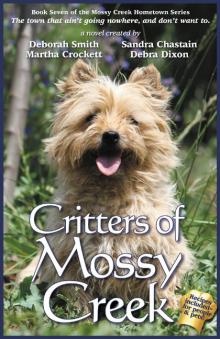 Critters of Mossy Creek
Critters of Mossy Creek Diary of a Radical Mermaid
Diary of a Radical Mermaid Caught by Surprise
Caught by Surprise Stranger in Camelot
Stranger in Camelot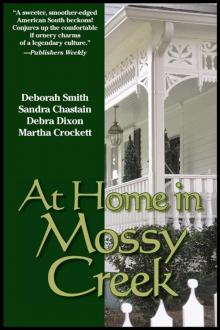 At Home in Mossy Creek
At Home in Mossy Creek Charming Grace
Charming Grace Blue Willow
Blue Willow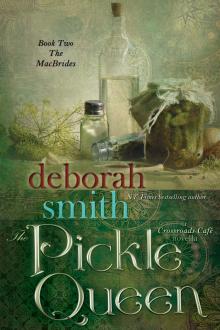 The Pickle Queen: A Crossroads Café Novella
The Pickle Queen: A Crossroads Café Novella On Bear Mountain
On Bear Mountain The Biscuit Witch
The Biscuit Witch Sara's Surprise
Sara's Surprise More Sweet Tea
More Sweet Tea The Apple Pie Knights
The Apple Pie Knights The Silver Fox and the Red-Hot Dove
The Silver Fox and the Red-Hot Dove Sweet Hush
Sweet Hush California Royale
California Royale Hot Touch
Hot Touch Miracle
Miracle The Stone Flower Garden
The Stone Flower Garden A Place to Call Home
A Place to Call Home Silk and Stone
Silk and Stone Honey and Smoke
Honey and Smoke Jed's Sweet Revenge
Jed's Sweet Revenge Silver Fox and Red Hot Dove
Silver Fox and Red Hot Dove The Kitchen Charmer
The Kitchen Charmer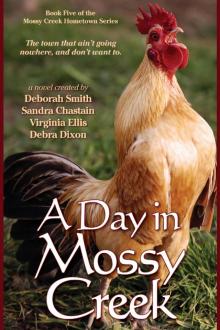 A Day in Mossy Creek
A Day in Mossy Creek Never Let Go
Never Let Go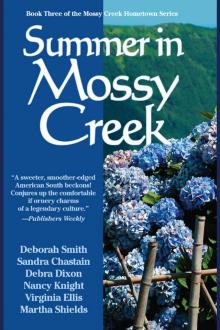 Summer in Mossy Creek
Summer in Mossy Creek On Grandma's Porch
On Grandma's Porch The Crossroads Cafe
The Crossroads Cafe Follow the Sun
Follow the Sun The Yarn Spinner
The Yarn Spinner A Gentle Rain
A Gentle Rain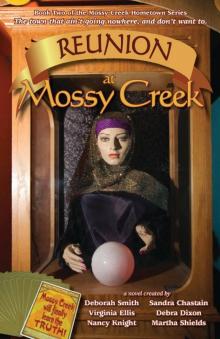 Reunion at Mossy Creek
Reunion at Mossy Creek